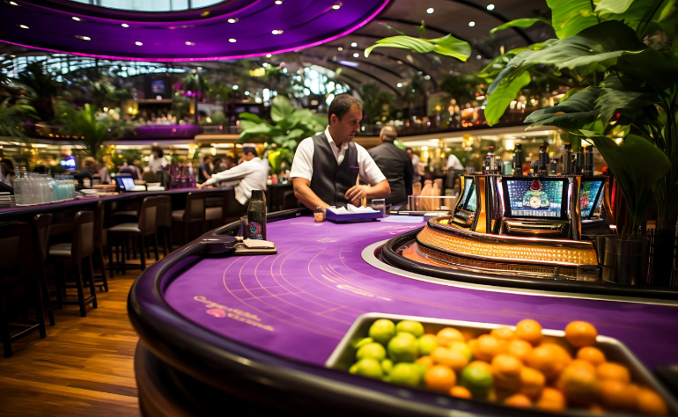
Gambling games have enthralled players over the ages, transforming from simple pastimes to sophisticated forms of entertainment that integrate chance, strategy, and fun. From the early beginnings of gambling in societies including ancient Mesopotamia and Rome to the glitzy corridors of contemporary casinos, the evolution of these games reveals much about the human experience and our relationship with luck. As cultures blended and innovation has progressed, casino games have evolved, reflecting societal changes and advancements in gameplay.
The initial iterations of gambling likely featured elementary games involving dice and placing bets on the outcomes of sports competitions. Over time, these basic forms of gambling grew into more structured games like table games, roulette, and the myriad one-armed bandits that fill the floors of casinos today. Each era brought its distinct regulations, visual styles, and cultural importance. At present, casino games continue to evolve with the rise of online platforms, enabling players from various parts of the world to join in a common experience, further fusing the traditional with the modern era.
Early Origins of Casino Games
Gaming activities have foundations that stretch back to ancient civilizations, where wagering was strongly integrated in social traditions and social customs. The first known forms of gambling developed in Mesopotamia around three thousand BC, including basic dice games made from knuckle bones. These initial games laid the foundation for more complex gambling activities, showing humans’ instinctive urge to seek fortune and amusement through luck.
As societies progressed, so did their gambling pursuits. In ancient Chinese culture, around 2300 BC, tiles were discovered that looked like primitive basic forms of a lottery activity. More structured instances of gambling arose in the ancient Roman Empire, where games of luck were a popular pastime, often taking place in social events. https://mm99.hot/ The Romans developed various betting games, which composed die and table activities, showing the pervasive nature of gambling across different social classes.
With the passage of time, these primitive games contributed to the evolution of modern casino games. In the medieval period, card activities grew prevalent in European culture, paving the way for the professional gaming establishments we know today. The shift from casual betting to formal gaming in pubs and private homes marked a major transformation in how people engaged with activities of luck, leading to the subsequent creation of gaming houses as dedicated places for gambling.
The Rise of Contemporary Casino Gaming
The final 20th century marked a pivotal change in the realm of casino games, driven by technological progress and transformations in societal views towards gambling. The emergence of computers and the World Wide Web transformed the way players engaged with their beloved casino games. Virtual casinos emerged, enabling enthusiasts to enjoy traditional casino classics like poker and blackjack from the convenience of their houses. This new online environment not only broadened availability to casino games but also attracted a newer demographic who found the comfort and diversity tempting.
As digital gambling gained traction, so did innovations in gaming technology. The creation of high-quality programs and graphics changed conventional gambling games into engaging adventures. Players could now interact with authentic live dealers through live streaming, bringing the vibe of brick-and-mortar casinos directly into their houses. This blending of in-person play with online platforms created a unique hybrid experience that enhanced the community element of playing, making it possible for individuals to connect and challenge with fellow gamers around the planet.
Furthermore, the rise of mobile gaming dramatically changed the casino landscape. With the ubiquitous use of mobile phones and touch devices, players can enjoy their beloved casino games anywhere, whenever. Mobile apps offer a vast array of games optimized for mobile screens, catering to the dynamic daily life of modern users. This easy access has resulted in rising engagement in gambling, fostering the surge of the gambling sector. As a result, the outlook of casino gaming continues to evolve, responding to technological advancements and shifting consumer preferences.
The Impact of Technology on Casino Games
The evolution of technology has significantly transformed casino games, enhancing the overall gaming experience for gamblers globally. As the internet emerged, online casinos emerged, allowing players to enjoy their favorite games from the safety of their own homes. This shift not only made casino games more available but also expanded the variety of games available, as online platforms could host numerous variations of traditional games without the limitations of brick-and-mortar establishments.
Mobile technology further transformed the casino gaming landscape. As smartphones and tablets became widespread, players can to engage in casino games whenever and wherever they want. This flexibility has led to the development of dedicated mobile applications and optimized websites that provide seamless gaming experiences. Additionally, advancements such as live dealer games have delivered the authentic atmosphere of a casino into players’ living rooms, bridging the gap between physical and online gaming.
Furthermore, advancements in artificial intelligence and virtual reality are leading to the next generation of casino games. AI enhances game design and player interaction, creating tailored experiences based on user behavior and preferences. Meanwhile, virtual reality offers immersive environments where players can interact in a virtual casino environment, making the gaming experience more exciting and lifelike. As technology continues to evolve, the future of casino games seems bright, filled with limitless opportunities for advancements and entertainment. Trang Chủ MM99